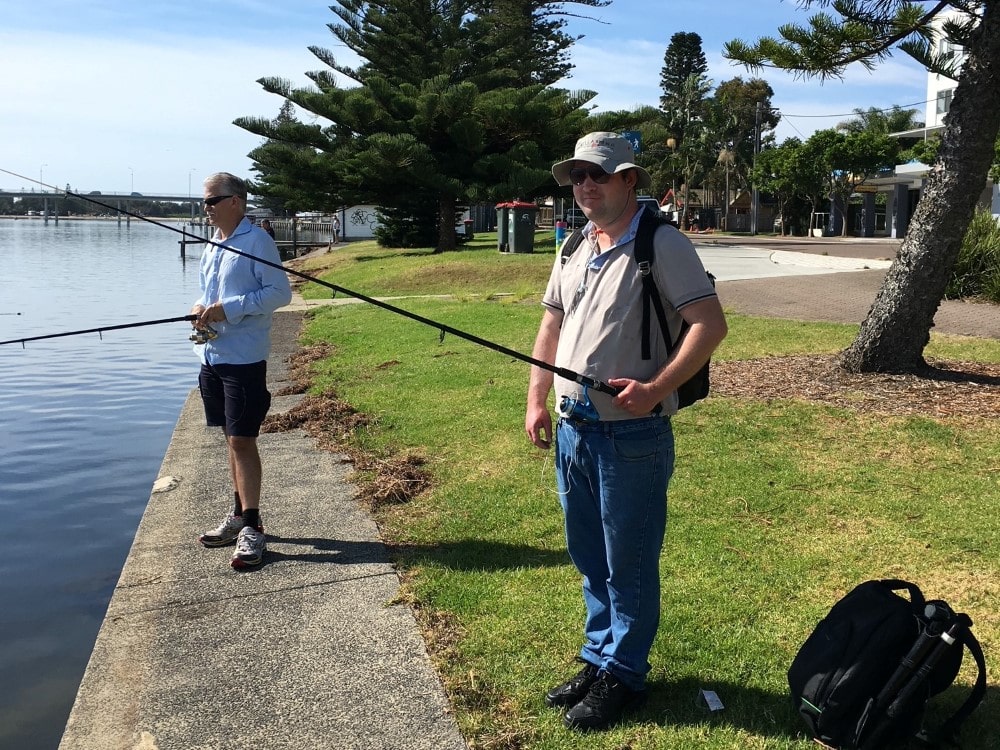
From homelessness to a place to call your own
Grant Wilson has turned his life around – six years ago he was homeless, lonely, and struggling with a gambling addiction and day-to-day life. Now, the 35-year-old is living life to the fullest.
Grant loves to play tricks and tell jokes when he’s selling his copies of The Big Issue – the street magazine which gives people who are homeless or at risk of homelessness the chance to earn an income.
One of his favourite jokes, Grant says, is to tell people to pull up their socks when they’re not wearing any socks.
“Or I tell people who are pushing their shopping trolley that they’ve got a flat tyre.”
However, before he pranks a passer-by, he always looks at a person’s face “to see if they’re in a good mood.”
Grant, 35, is living with an intellectual disability. Six years ago he was homeless, battling a gambling addiction, lacking in family support due to his past volatile behaviours, and struggling with day-to-day life.
Now, he is selling The Big Issue four or five days a week while living in his own apartment at Common Ground Canberra.
Moving on…
When he was 8, Grant was diagnosed with DiGeorge syndrome, or 22q11.2 deletion syndrome. He was also diagnosed with Oppositional Defiance Disorder (ODD) and, after his family tried desperately to handle his increasingly difficult behaviours, he was cared for by a government-run service outside the home. He left the organisation when he was 16 and lost touch with his family.
Grant moved around and was frequently homeless. By the time he was in his late teens, he met some people who were involved with The Big Issue.
Grant began selling the magazine and gradually built his own support networks.
Grant’s aunt, Melinda Kopilow – who lives in Canberra and regularly spends time with her nephew – says Grant’s behaviours also began improving during this time.
“It was through working for The Big Issue that Grant got permanent housing. As life became more stable, he was able to get back in touch with his mum and myself.”
Grant moved into Common Ground six years ago – his neighbours in the building include refugees, people with disabilities and others who have experienced homelessness. The Common
Ground housing model which provides permanent, safe, supportive accommodation to people who were formerly homeless or at risk of homelessness, helps people achieve stability.
Care, compassion and social connections with the NDIS
Melinda says that a year after Grant had moved into his Common Ground apartment, the NDIS was created and he was able to begin accessing a range of supports.
“Now, he really is living life to the fullest. He’s really good.”
Feros Care’s Local Area Coordinator, Charmaine Matthias has fostered a solid relationship with Grant while she has been working with him and helping him meet his NDIS goals.
“I came into the picture two years back and he’s continued to be in a really good space from where he was.”
Melinda says that the NDIS “coincided with things coming together for Grant.”
“It’s the icing on the cake and has taken his life to a whole other level.”
Through his NDIS care plan, Grant is able to spend time with a support worker to attend activities, shop for food and help with cooking meals. He receives domestic support and funding for
further education.
“Before the NDIS, Grant was living on takeaway, and now his diet has improved so much as he’s become better at being able to prepare simple meals for himself,” Melinda
says.
“He goes Ten-pin bowling with his support workers and he recently did a Certificate 1 and Certificate 2 in business.”
Grant goes to the gym twice a week, and before Covid-19 he was swimming in the local pool. He is also hoping to reduce or give up smoking in the next year.
One of Grant’s long-term goals is that he would like to study computing or programming so he can design all-access applications to assist people with a disability.
“I’d like the government to help with start-up applications as at school there was no classes for that sort of thing.” Grant says.
Melinda describes her nephew as amazing.
“I’m very proud of him. He’s in a place where he’s ready to grow and move on, and you can now have a very mature conversation with Grant,” she says.
In moving past his gambling addiction, Grant has learnt how to self-exclude from clubs and casinos.
He is advocating for people with disabilities as he wants it to be easier to manage exclusion for life.
“Because of my gambling problems in the past, I wanted to help other people. If people aren’t helping themselves, then they need someone to help them, and that’s what
I want to do.”
A time to celebrate
Overall, Grant says he “can’t complain”. And for his birthday later this month, he’s planning to book two lanes at his local bowling alley and play 35 games with
his support worker.
He’s currently saving his earnings to buy a batch of The Big Issue Christmas calendars which he can start selling from October.
“It’s really busy then. But after Christmas, it gets really quiet and I can take it easy. I have a holiday booked at Kiama.”
The holiday, with Melinda and other family members, will include a trip to a water park and plenty of fishing.
CLICK HERE.
CLICK HERE.